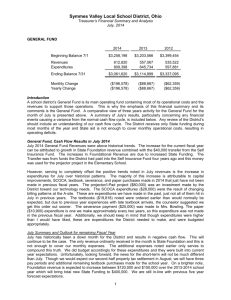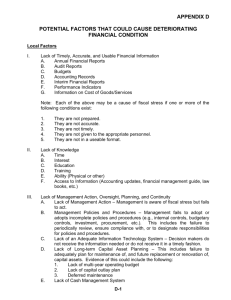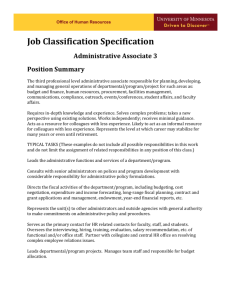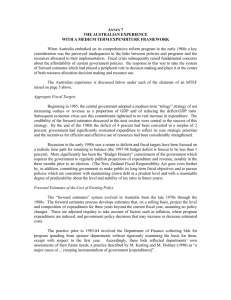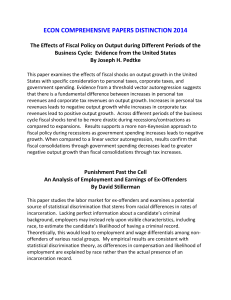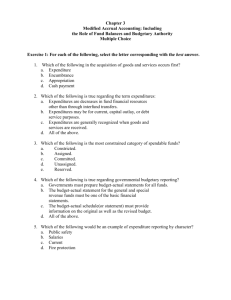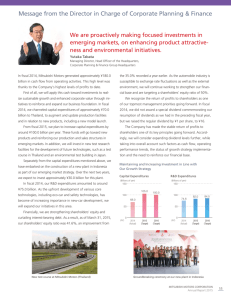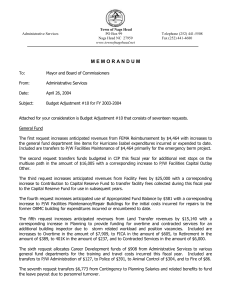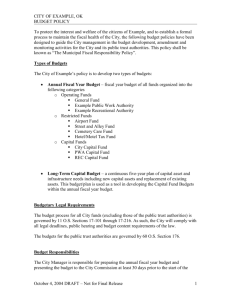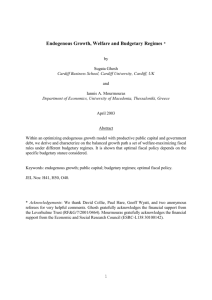Budget Roles & Responsibility
advertisement
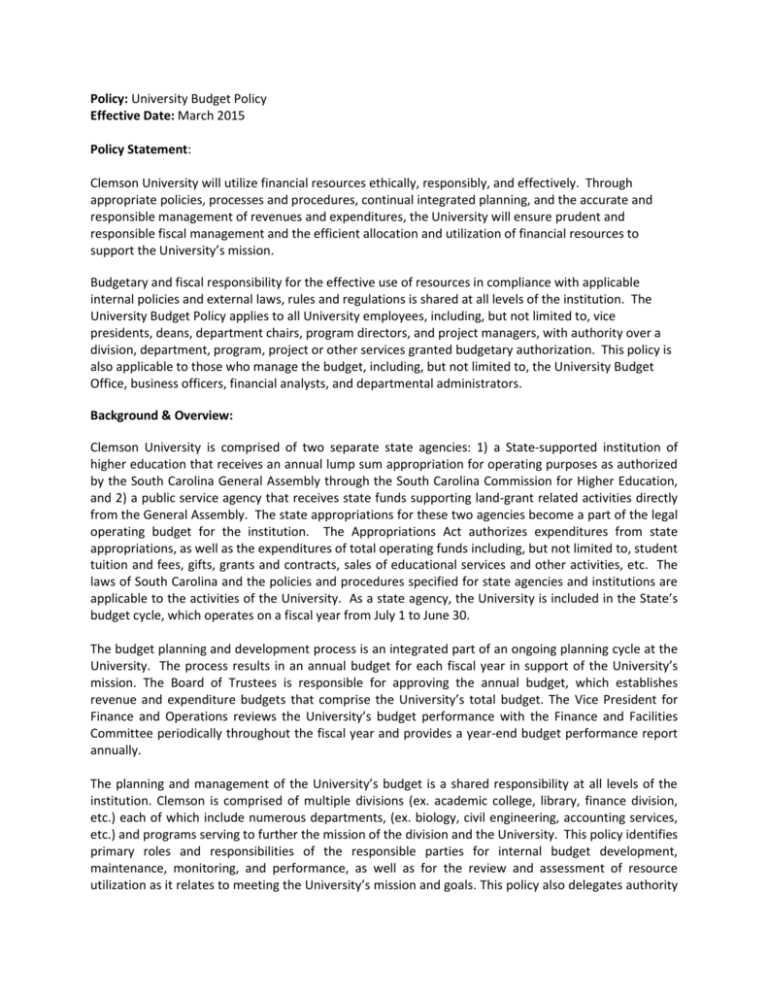
Policy: University Budget Policy Effective Date: March 2015 Policy Statement: Clemson University will utilize financial resources ethically, responsibly, and effectively. Through appropriate policies, processes and procedures, continual integrated planning, and the accurate and responsible management of revenues and expenditures, the University will ensure prudent and responsible fiscal management and the efficient allocation and utilization of financial resources to support the University’s mission. Budgetary and fiscal responsibility for the effective use of resources in compliance with applicable internal policies and external laws, rules and regulations is shared at all levels of the institution. The University Budget Policy applies to all University employees, including, but not limited to, vice presidents, deans, department chairs, program directors, and project managers, with authority over a division, department, program, project or other services granted budgetary authorization. This policy is also applicable to those who manage the budget, including, but not limited to, the University Budget Office, business officers, financial analysts, and departmental administrators. Background & Overview: Clemson University is comprised of two separate state agencies: 1) a State-supported institution of higher education that receives an annual lump sum appropriation for operating purposes as authorized by the South Carolina General Assembly through the South Carolina Commission for Higher Education, and 2) a public service agency that receives state funds supporting land-grant related activities directly from the General Assembly. The state appropriations for these two agencies become a part of the legal operating budget for the institution. The Appropriations Act authorizes expenditures from state appropriations, as well as the expenditures of total operating funds including, but not limited to, student tuition and fees, gifts, grants and contracts, sales of educational services and other activities, etc. The laws of South Carolina and the policies and procedures specified for state agencies and institutions are applicable to the activities of the University. As a state agency, the University is included in the State’s budget cycle, which operates on a fiscal year from July 1 to June 30. The budget planning and development process is an integrated part of an ongoing planning cycle at the University. The process results in an annual budget for each fiscal year in support of the University’s mission. The Board of Trustees is responsible for approving the annual budget, which establishes revenue and expenditure budgets that comprise the University’s total budget. The Vice President for Finance and Operations reviews the University’s budget performance with the Finance and Facilities Committee periodically throughout the fiscal year and provides a year-end budget performance report annually. The planning and management of the University’s budget is a shared responsibility at all levels of the institution. Clemson is comprised of multiple divisions (ex. academic college, library, finance division, etc.) each of which include numerous departments, (ex. biology, civil engineering, accounting services, etc.) and programs serving to further the mission of the division and the University. This policy identifies primary roles and responsibilities of the responsible parties for internal budget development, maintenance, monitoring, and performance, as well as for the review and assessment of resource utilization as it relates to meeting the University’s mission and goals. This policy also delegates authority to the administration to perform various fiscal and operating functions on behalf of the Trustees and Clemson University. Roles & Responsibilities: Budget Approval & Delegation of Authority to the Administration The Board of Trustees of the University requires the administration to submit the operating budget for each fiscal year for approval by the Trustees. In approving budgets, the Board of Trustees recognizes that (1) amounts budgeted as income are estimates and subject to change, (2) amounts budgeted for expenditures are a reflection of plans and workload estimates as of the time the budget is prepared, (3) the dynamic environment of a research university results in changes as a normal course of business and thus requiring adjustments in plans, programs, estimates, and budget items. To provide for continuity and essential flexibility in operations, the Board of Trustees reaffirms the delegation of necessary authority to the President to act in all matters and to the Vice President for Finance and Operations to act in fiscal, contractual and other business matters, including specifically, authority to negotiate and make timely changes in contracts, to approve transfers and expenditures of funds permitted in the General Appropriations Act, including those funds commonly referred to as “contribution or gift funds” to be retained at the University, to adjust operating, permanent improvement and other income and expenditure items, and to take such other actions considered necessary in fiscal, contractual or other business matters in response to changing conditions and estimates. Role of the University Budget Director Reporting to the Vice President for Finance and Operations, the University’s budget director is the primary administrator of the University’s total annual budget. As such, the director is responsible for ensuring the integrity, accuracy, compliance and reasonableness of the total annual operating budget in accordance with the University’s plan. Additionally, the director is charged with monitoring budget performance and alerting the Vice President for Finance and Operations, division heads, and other appropriate administrators of anomalies and significant projected or actual variances from the established budget. The budget director further serves to assist divisions in ensuring prudent and responsible budget administration, including budget development, maintenance, monitoring, performance, and the resolution of budgetary opportunities and challenges. Identifying and communicating trends and internal and external factors that may influence the effective use of resources in support of the University’s mission is a critical function of the budget director. To facilitate effective ongoing planning and assessment, the budget director is expected to communicate such factors to the administration and division heads, as well as incorporate these factors into the budget planning process. Role of the Business Officer Each division within the University is delegated budgetary authority. Divisions have the autonomy to plan and budget within authorized revenues and expenses. Business Officers serve as the primary administrators of a division’s budget and are responsible for ensuring the integrity, accuracy, compliance and reasonableness of the budget. Business Officers should monitor budget performance and alert the division head and the University’s budget director of anomalies and significant projected or actual variances from the established budget. Business Officers are also responsible for ensuring responsible budget administration at the divisional level and for providing guidance during the planning process regarding important factors that may influence the effective allocation of the division’s resources in support of the University’s mission. Budget Development & Effective Resource Allocations University employees with budgetary authority have a direct responsibility to align the allocation of resources to invest in priorities and initiatives that support the University’s mission. They also have a responsibility to coordinate with budget administrators to develop a responsible, reasonable, and realistic annual budget for their division. Budget development coordination should include the analysis of all resources available to the division, reasonably estimating resource targets for the fiscal year, and allocating these resources to meet strategic goals. Responsible Budget Management University employees with budgetary authority are expected to monitor revenues and expenses regularly. They are further expected to review budget versus actual reports to proactively assess budget performance and ensure that budgeted revenues are realized and that spending is within budgetary authority. As a result of regular monitoring and ongoing planning, changes may be required after the annual budget is approved by the Trustees to more accurately reflect anticipated revenues and expenses. The aforementioned responsible party should communicate such changes when they become evident to the appropriate budget administrator, so the budget can be adjusted in a timely manner. The budget should accurately reflect anticipated financial activities at all times for the fiscal year for both revenues and expenditures within the appropriate categories from the University’s chart of accounts. When the budget planning and monitoring processes indicate a shortfall in annual revenue estimates or spending patterns that may result in a deficit, responsible actions to prevent the budget shortfalls should be taken. Vice Presidents, deans, and division heads should notify the Budget Office immediately of the potential budget deficits or revenue shortfalls. This notification should be accompanied by proposed plans to address the associated financial challenges. Such actions may include, but are not limited to, the reallocation of resources, cost containment, or an approval from the Vice President or the Vice President for Finance and Operations to exceed authorized spending authority. Budget Review and Assessment University employees with budgetary responsibility are expected to regularly review and monitor the use of budgeted resources within their area of responsibility and assess the resource allocations for effective utilization supporting the University’s mission. Any adjustments or reallocations should become part of the University’s ongoing planning cycle and reflected in current or future year plans.
